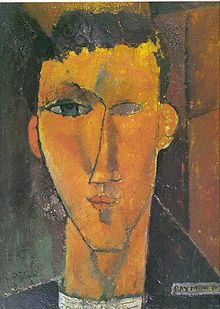Raymond Radiguet

Raymond Radiguet (born June 18, 1903 in Saint-Maur-des-Fossés , † December 12, 1923 in Paris ) was a French writer, poet and journalist. Among other things, he worked as a librettist and playwright .
Life
Raymond Radiguet, son of the draftsman Maurice Radiguet, was the eldest of seven siblings. After attending primary school, he attended the renowned Lycée Charlemagne in Paris . He was a mediocre student, but read with enthusiasm the French works of the 17th and 18th centuries (especially The Princess of Clèves by Madame de Lafayette ), later Stendhal , Proust and the poems of Verlaine , Mallarmé , Rimbaud and Lautréamont .
At the age of fifteen he dropped out of school to devote himself to journalism . He made friends with the writers and poets André Salmon , Max Jacob , Pierre Reverdy and his later publisher François Bernouard , made the acquaintance of the painters Juan Gris , Picasso and Modigliani and associated with young composers such as Milhaud , Georges Auric , Francis Poulenc and Arthur Honegger . Under the pseudonym "Rajiky" he wrote several fairy tales in the young newspaper Canard enchaîné .
In 1918 he met Jean Cocteau , who recognized his talent, encouraged and promoted him, and helped him publish his poems in avant-garde reviews such as Sic and Littérature . In May 1920, the two now inseparable friends founded the Revue Le Coq , for which they recruited the composer Georges Auric, the painter Roger de la Fresnaye , the writer Paul Morand and the Romanian Dadaist Tristan Tzara as collaborators.
In September 1921, Raymond Radiguet completed the novel The Devil in the Body (Le Diable au corps) . Bernard Grasset launched the work in 1923 through a spectacular advertising campaign (“The first book by a 17-year-old novelist”) , which was judged by the critics as bad taste and triggered both mocking and hostile remarks. After the novel was published, however, the young writer was able to receive congratulations from renowned writers such as Paul Valéry , René Benjamin (Prix Goncourt 1919), Henri Massis (editor of Revue Universelle ) and Max Jacob.
Raymond Radiguet died a short time later on December 12, 1923 at the age of 20 of typhus . Jean Cocteau, who assisted him, wrote his last words in the foreword of the posthumously published novel The Ball of the Count of Orgel (Le bal du comte d'Orgel) . Radiguet was buried in the Père Lachaise cemetery in Paris .
plant
- The volume of poetry Les Joues en Feu was published in 1920 by François Bernouard.
- The novel The Devil in the Body (Le diable au corps, 1923) is the largely autobiographical story of a passionate love between a 15-year-old precocious student (the first-person narrator) and an 18-year-old soldier's bride and later soldier's wife who is bored while her fiancé or husband is at war and lets herself be seduced after the wedding. The relationship ends when the soldier returns home after the end of the war. The novel closes with the birth of a child and the death of the young mother. The work was initially a scandalous success, was constantly reprinted and is still read with interest today. It was made into films several times (1946, 1970, 1986 with Maruschka Detmers , 1989 and 1990).
- The Ball des Comte d'Orgel (Le Bal du comte d'Orgel) , Radiguet's second, posthumously published novel, was less popular.
- The collected works (Œuvres complètes de Raymond Radiguet) were published in 1993 in Paris (Editions Stock).
- Vers libres , 1926 (posthumous)
- In 2012, Chloé Radiguet and Julien Cendres published a volume with 140 letters from Radiguet as part of a complete edition of Radiguet's works. Addressees are writers, artists and musicians from Paris in the 1920s, including the authors Guillaume Apollinaire, Louis Aragon, André Breton, Jean Cocteau, Max Jacob, Tristan Tzara, the painters and sculptors Constantin Brancusi, Juan Gris, Valentine and Jean Hug, the Composers Georges Auric and Francis Poulenc, the publishers Pierre Albert-Birot , Gaston Gallimard , Bernard Grasset and his patron Jacques Doucet .
Film adaptations
- 1947: Stormy Youth ( Le Diable au Corps ) - Director: Claude Autant-Lara
- 1970: The Ball des Comte d'Orgel ( Le bal du Comte d'Orgel ) - Director: Marc Allégret
- 1985: Devil in the Flesh - Director: Scott Murray
- 1986: Devil in the Body - Director: Marco Bellocchio
- 1990: Le diable au corps (TV film) - Director: Gérard Vergez
Individual evidence
- ↑ Keith Goesch: "Raymond Radiguet - étude biographique, bibliography, textes inédits, avec un avant-propos de Jean Cocteau", 1955, La Palatine
- ↑ a b Gert Pinkernell: "French Literature"
- ^ Raymond Radiguet. Lettres retrouvées. 2012.
Web links
- Literature by and about Raymond Radiguet in the catalog of the German National Library
- Raymond Radiguet in the Internet Movie Database (English)
| personal data | |
|---|---|
| SURNAME | Radiguet, Raymond |
| BRIEF DESCRIPTION | French writer, poet and journalist |
| DATE OF BIRTH | June 18, 1903 |
| PLACE OF BIRTH | Saint-Maur-des-Fossés |
| DATE OF DEATH | December 12, 1923 |
| Place of death | Paris |